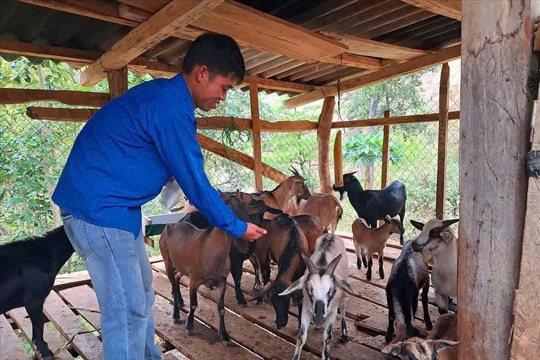Dear shadow of village dike
(Baonghean.vn) - Our country, a soft strip of land lying in front of the sea on the map, a country of many rivers and streams, of many storms, floods... is also a country of dikes.
Familiar in the heart of every Vietnamese is the shadow of the village dike. The dikes prevent floods and storms, keeping the crops and villages peaceful. The dikes are also silent witnesses, witnessing the passing of many lives, people's footsteps from infancy to old age, many farewells and returns, many dates, many changes of hometowns...
From that dike, I go…
I once left the village, and at the last minute, when the car rolled on the familiar dike, I turned back to look at the green bamboo grove where we used to go to catch fireflies every night when we were young, and caught a glimpse of the sweet scent of the land and crops in the wind. With tears in my eyes, I almost wanted to tell the driver to stop, throw away my newly bought shoes and run barefoot down the dike…
On that dike, our childhood passed like a dream. We were the children who ran away from their mothers to play in the hot afternoon sun, the romantic shepherds singing on the back of a buffalo, the 9-year-old child who was gored by a buffalo and left a long scar, the little girl whose eyes were always wet as if she was about to cry, the dark-skinned boy with a dry smile, the group of people with muddy feet running on the village dike to chase a ball, to fly a kite… We, the children who cried and laughed on the dike throughout our childhood, grew up in that dream that seemed never to end.
When I was far from home, I knew what nostalgia was. A sad rain, a cool breeze, a purple color of xoan trees, a ferry crossing the river, a kite fluttering in the sunset... could all make those who were far away from home shed tears. And in my sleepless dreams, the village dike appeared both familiar and distant. The footsteps of children running on the dike appeared in my memory like a slow-motion film. The wind was always strong on the dike. The wind became our close friend, it carried the salty, strong scent from the riverbank.
A friend of mine also told me about a dike in her village memories. She said that was where she saw her father off to work abroad, that day was also the last time she and her father saw each other. Her mother was sick and bedridden, she was the one who saw her father off to the village entrance. He left without looking back. She didn’t understand why he didn’t look back, even now, decades have passed and she still doesn’t understand that. And he disappeared from her life like that, leaving behind an emptiness in her soul, along with a lingering sadness.
My mother once told me that during the war years, women of her generation sent their lovers off to war from the village dike. It was there that dates, loves, tears and smiles, happiness, waiting and even broken appointments took place. The small river flowing at the foot of the dike had no name. The villagers often called it the dike river, because there was no more suitable name to call it. It was that river, that dike that witnessed so many vows and separations, and later, with our generation, witnessed so many memories filled with emptiness. That river, that dike, was the soul of the village, the soul of the homeland. A place where just thinking about it would make our hearts sink and our eyes fill with tears.
Spirit of the homeland
There are countless dikes like that in the Vietnamese countryside. The dike waiting for someone's figure in Nguyen Binh's poem, the dike "worn grass path" in a young woman's day crossing the river in Tran Tien's music... There are many other dikes that prevent floods and protect villages. Not only do they prevent floods and protect villages, the dikes are also historical evidence, recording the heroic history of the nation, where so much blood and bones were shed to have peace for today.
Anyone who has ever slowly driven along the Lam River dike, will suddenly come across a small cemetery along the dike section passing through Hung Khanh commune, Hung Nguyen district. The cemetery is nestled on the bank of a tall, towering dike that the people of Hung Nguyen used to call the dike martyrs cemetery. Perhaps this is the only dike martyrs cemetery in our country. Here, on August 27, 1967, a tragic event took place: From dawn, the militia of the two communes of Hung Khanh and Hung Thang gathered on the important dike running through their communes to do dike rescue work, filling bomb craters overnight to clear the supply route for the South to fight the Americans. Around 5 a.m., some people had finished their work and carried hoes and shovels back to the village, while others were still working overtime, when suddenly two American planes discovered them and "swooped" down to drop bombs. That bombing took the lives of 15 militiamen on the dike, injured 23 others, and more than 20 other villagers. Bodies lay scattered in the jagged bomb craters plowed on the village dike. The 4th day of the 8th lunar month every year has become the common death anniversary of the villagers. So, pouring down on the village dike, not only sweat, tears, but also blood, and the souls of people who loved the village and defended the country... To make the dike become a symbol, the soul of the village...
The village dike, where people gather, live, play, where people date, say goodbye, where people love and part, reunite, where people leave to forever remember a breath of wind carrying moisture, a kite, a hurried step, a flute sound... The place where, in the most fierce or painful days of life, we dream of returning.
And the dream of returning…
Many times I absentmindedly miss my hometown, miss the dike at the village entrance, and then I miss the dike that witnessed my friend seeing her father off and the many afternoons she cycled home after school, swallowing her tears because she missed her father. I miss the dike of Nguyen Binh, Tran Tien and many other writers, poets, and musicians. I miss the dikes of Vietnamese villages, the salty sweat that fell on them, the blood and bones that were shed, the crisp smiles in the wind, the sound of the flutes of the shepherds blowing, cooling the foot of the dike…
There are days like that, I keep missing the dikes. I long to return to the old river, to splash my hands in the cool water and hear the wind blowing through the bamboo bushes somewhere. I long to walk barefoot on the grass in the afternoon sun, to bend down and pick the wild flowers of the xuyến chi that grow with an endless vitality. I long to fondle a branch of the grass, to hear the laughter of the children in the neighborhood rushing to it, the chirping of insects on moonlit nights. I long to see my grandmother's shadow returning from the temple swaying in the sunlight at the foot of the dike. I long to see my mother with her burdens, busily struggling in the headwind. I long to sit and wait for my mother among the chirping grasshoppers.
Those dreams, that longing, sometimes strongly arise in me and feel like they are more real than life, more real than reality. It makes me really think that, not only the sunny dike in my hometown, but any other dike, can become my homeland, my flesh and blood. The places I have been through, the dikes I only had time to see when the train was rolling, the dikes my friends told me about, the historical dikes, even the dikes I have never seen, I don’t know since when, they have remained in my heart as a memory, no, like a dream. That dream never fades, it just floats in my life, sometimes it makes me sad and nostalgic but it always gives me a feeling of peace and warmth. It is like a waiting ferry, a handshake from an old friend, a fragrant flower-scented step waiting for someone with tired feet to rest. It's like a mother, waiting for us to come home whenever we want, holding us whenever we need, caressing us when we cry, worrying and waiting when we leave. It's like us, no matter where we go, we're still us.




